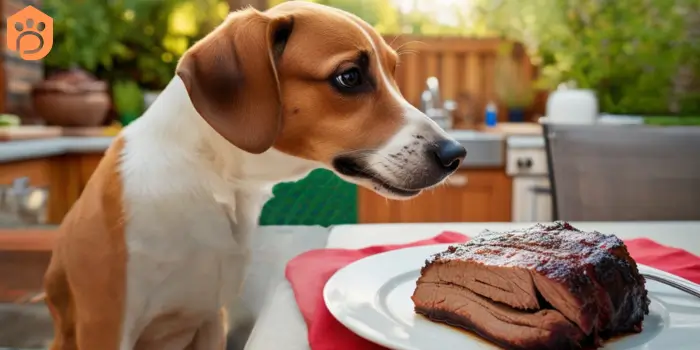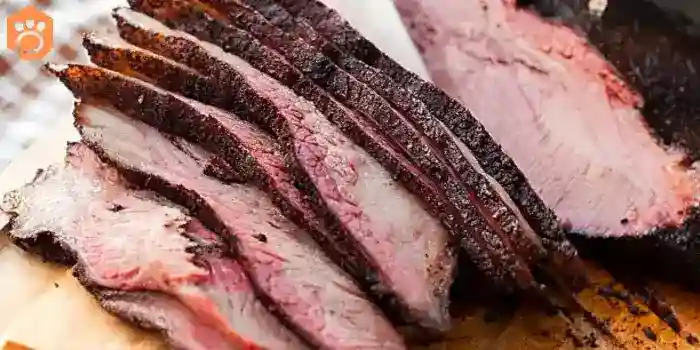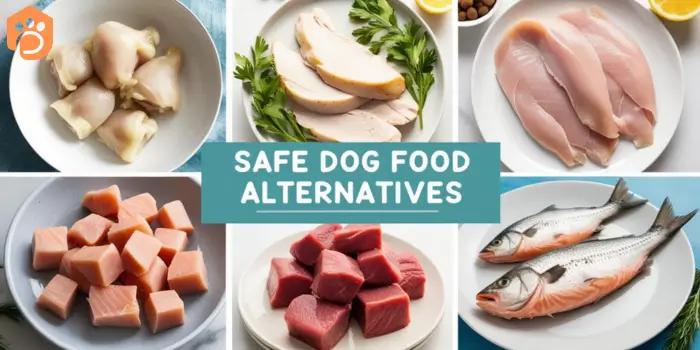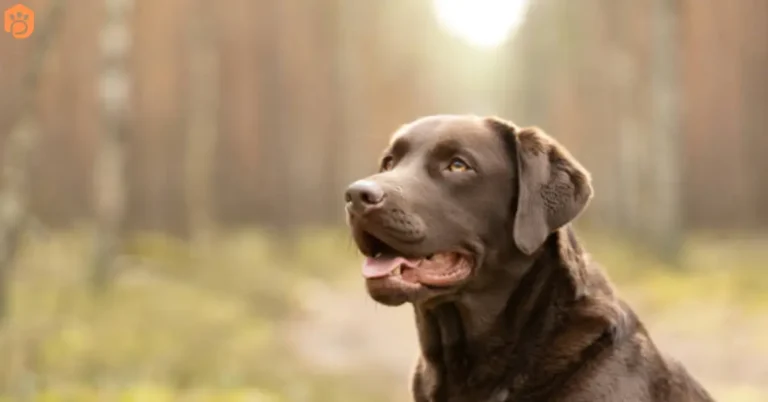Can Dogs Eat Brisket? Critical Warnings for Dog Owners!
Brisket might seem like a tempting treat to share with your furry friend during a backyard barbecue, but it’s important to be a responsible pet owner and understand the potential risks. While plain, unseasoned beef can be safe for dogs in small amounts, seasoned brisket is often loaded with spices, seasonings, and ingredients like garlic, onion, and excessive salt that can be harmful to your dog’s health. These additives are not just bad for dogs; they can be downright toxic and may lead to adverse effects like upset stomachs or even more serious complications such as pancreatitis or anemia.
Many dogs are naturally curious and eager to eat whatever their humans are having, but that doesn’t mean it’s the best choice for them. Feeding your pet brisket can be a bad idea, as this barbecue delicacy is often high in fat and other potentially dangerous ingredients that can lead to health issues. Instead of offering your beloved dog brisket, it’s wise to guide them towards safer alternatives. There are many other foods that can be just as satisfying without the risks. Always break down the details and consider your dog’s dietary needs before you feed them any human foods.

Key Takeaways
- Plain, unseasoned beef can be safe for dogs in moderation, but seasoned brisket poses significant health risks due to harmful ingredients.
- Common ingredients in brisket, such as garlic and onion, are toxic to dogs and can cause serious health complications.
- Brisket is typically high in fat, which can lead to pancreatitis and other digestive issues in dogs.
- Pet owners must prioritize their dogs’ dietary health by offering safer alternatives to human foods like brisket.
- Always assess your dog’s specific dietary needs before introducing any new foods.
What Is a Brisket?
Brisket is a cut of beef taken from the lower breast of a cow, known for its well-worked muscles in this area of the body. This meat is tough but cooks best when prepared in a slow cooker with seasoning and vegetables. The result is a delicious dinner that everyone loves, and it might be tempting to offer some to your dog as a treat. However, while the brisket can be appealing, the seasonings and other cooking ingredients can harm your pet.
Although many dogs are eager to enjoy what their owners eat, it’s important to be cautious. Brisket seasonings, such as garlic, onion, or excessive salt, are not safe for dogs and can lead to health issues. Always think twice before sharing this popular dish with your furry friend, and consider other safer treats that won’t risk their health.

Can Dogs Eat Brisket? Is Brisket Safe for Dogs?
Brisket is many humans’ favorite weekend barbecue dish, often enjoyed during celebratory gatherings. This slow-cooked beef is delicious but not always the best choice for dogs. While a small bite might not seem harmful, the spices and seasonings used in brisket can pose a serious risk. Ingredients like sodium and excess fat are unsuitable for dogs and can even be toxic in larger amounts. If your dog sneaks a piece, there’s no need to panic immediately, but you should watch for any signs of discomfort.
Feeding brisket as a regular food to your dog is not advisable. The rich flavors we enjoy can be overwhelming and harmful to their health. Always consult your veterinarian for the best advice if your dog has accidentally eaten brisket, as they can guide you on handling any potential issues. It’s always better to keep brisket off your dog’s menu and stick to safer treats that won’t compromise their well-being.
Brisket Nutrient Values
| Nutrient | Amount per 3 oz Serving |
| Protein | 25 grams |
| Fat | 15 grams |
| Sodium | 75 milligrams |
| Iron | 2 milligrams |
| Selenium | 20 micrograms |
| Zinc | 3 milligrams |
Vet-Reviewed Nutrition Facts
When considering brisket for your dog, it’s important to know that while brisket comes from beef and is rich in protein and essential minerals like iron, zinc, and selenium, it also contains high levels of fat, which can be tough on a dog’s digestive system. The B vitamins in brisket support metabolism, but how brisket is usually cooked—with spices, onions, and garlic—can make it potentially poisonous for dogs. Most vets suggest sticking to leaner meats that are safer and easier for dogs to digest without risking their health.
The Risks of Feeding Brisket to Dogs
Feeding brisket to your dog poses several risks. Here’s a breakdown:
High-Fat Content
Brisket is a fatty cut of meat that can pose serious risks to dogs if consumed in large amounts. The high-fat content can lead to obesity, diabetes, and heart disease, while consuming too much can cause short-term health issues like pancreatitis, which is both dangerous and painful. Over time, this can also lead to joint pain and other severe complications, making brisket a risky choice for your dog’s diet. According to the American Kennel Club, feeding high-fat foods to dogs significantly increases the risk of pancreatitis and other digestive problems, highlighting the importance of choosing safer alternatives.
Seasonings and Spices
Brisket is often prepared with various seasonings and spices, like onion, garlic, and powder, which can be toxic to dogs even in small amounts. These ingredients can cause severe digestive issues and lead to more serious health problems such as anemia. The combination of these spices makes brisket an unsafe choice, posing significant risks to your dog’s overall well-being.
Sauces and Marinades
Brisket recipes often include rich sauces and marinades filled with sugar, salt, and other artificial ingredients that are harmful to dogs. These additives can lead to weight gain, tooth decay, and overall unhealthy effects on your pet. Some marinades may even contain alcohol, which is especially dangerous for pets. While these flavors enhance the meal for humans, they pose serious health risks when consumed by dogs.
Symptoms to Watch For if Your Dog Eats Brisket
If your dog has eaten brisket, watch closely for any adverse symptoms that may indicate toxicity or digestive distress. Common signs include:
- Vomiting,
- Diarrhea,
- Lethargy,
- Weakness,
- Excessive Drooling or Thirst.
Your dog may also experience abdominal pain, appetite loss, or other signs of discomfort. If your pet consumes brisket and shows any of these symptoms, it’s important to contact your veterinarian for immediate guidance and care. Always proceed with caution to avoid any serious harm to your furry friend.

What Should I Do If My Dog Eats Seasoned Brisket by Accident?
If your dog accidentally eats seasoned brisket, don’t panic. A small portion might not hurt, but it’s still crucial to monitor for any digestive issues or signs of illness, especially in dogs with sensitive stomachs or those on a special diet. If your dog consumes a significant amount, it’s best to visit your veterinarian to ensure everything is fine. While it’s tempting to share, it’s important to refrain from feeding seasoned meat regularly and stick to safer options for your pet’s health.
Healthier Alternatives to Brisket for Dogs
Instead of brisket, consider safer alternatives that make a great treat for your dog. Look for meaty snacks that are both nutritious and safe, like:

Plain, Boiled Chicken
Plain, boiled chicken is a great alternative to brisket for dogs because it’s a simple source of protein that’s both safe and easy to prepare. Boiling the chicken removes excess fat and avoids harmful seasoning and bones, making it easier for your dog to digest. This straightforward option provides all the nutrients your dog needs without the risks that come with seasoned meats. For more safe and healthy dog food options, check out Can Dogs Eat Deviled Eggs?.
Turkey (Without Skin or Bones)
Turkey is a great option for dogs if you remove the skin and bones. Lean meat from turkey is free of excess fat and is unseasoned, making it a healthier choice than brisket. Removing the skin and bones not only makes turkey a safe and nutritious alternative but also reduces the risk of choking hazards for your dog.
Lean Beef
Lean beef, such as ground beef or steak, is a safe and healthy choice for dogs when properly prepared. Ensure the beef is cooked and unseasoned to avoid any harmful seasoning. Removing excess fat and offering small portions helps prevent digestive issues and keeps your dog happy and healthy. Avoid large portions to keep their diet balanced and avoid any potential health problems.
Fish
Fish, such as salmon and whitefish, is a good option for dogs and provides valuable sources of protein and omega-3 fatty acids. Cooking the fish thoroughly and ensuring you remove any bones makes it a healthy treat that can benefit your dog’s skin and coat. Avoid offering fish raw or with added seasonings to ensure it’s safe for your furry friend.
Safe Preparation Methods and Creative Treats
To safely feed your dog brisket, ensure it is cooked thoroughly and served plain without added spices or seasonings. If you really want to share a bit of brisket with your dog, here’s how to do it safely:
Trim the Fat
When feeding brisket to your dog, it’s crucial to trim all visible fat before cooking. Fat can harm dogs, so removing it helps make the meat safer for them.
Cook Plain
When cooking brisket for your dog, make sure to cook it plain—without any seasonings, spices, or sauces. Cooking the meat plain ensures it is free from harmful additives and safe for your dog’s diet.
Serve in Small Portions
When offering brisket to your dog, make sure to serve it in small portions. To avoid any health issues, it should be an occasional treat, not a meal replacement.
Remember that moderation is key if your dog is begging for a taste of brisket. Serve only small portions and ensure the brisket is free of harmful ingredients. Preparing plain and lean pieces without added spices or seasonings can make it a safe treat, balancing your dog’s health and well-being.
When Is Brisket Okay for Dogs to Eat?
Brisket can be okay for dogs if given in decent amounts and as part of a balanced diet. It provides beef protein, minerals like iron, zinc, selenium, and B vitamins. Ensure the brisket is free from poisonous additives and only serve it plain, as seasonings can be harmful.
Real-Life Vet Advice on Feeding Brisket to Dogs
Dr. Jessica Lopez, a veterinarian with over 15 years of experience, often advises against feeding dogs brisket. “While brisket is made from beef and contains beneficial protein and minerals like iron and zinc, the fat content is too high for most dogs,” she says. “Many pet owners don’t realize that the seasonings used, such as garlic or onions, can be poisonous to dogs.” Dr. Lopez recommends using plain, lean meats like chicken or turkey. “If you’re looking to add variety to your dog’s diet, choose something with B vitamins and less fat. It’s always best to keep their meals simple and safe.”
FAQs
Can I give my dog cooked brisket?
Feeding your dog brisket might seem like a treat, but there are better choices than Feeding your dog brisket. While beef is packed with protein and important minerals like selenium, zinc, iron, and B vitamins, much of what’s added during cooking can be poisonous to dogs. Things like seasoning, onions, and garlic can be harmful, and the high-fat content of brisket isn’t ideal for a dog’s diet. So, it’s safer to avoid giving your dog cooked brisket altogether.
Can Dogs Eat Brisket Safely?
Dogs can safely eat plain beef brisket, but seasoned brisket is risky due to harmful garlic, salt, and spices. Feeding your dog plain, unseasoned brisket in small amounts can avoid potential health issues related to spices and additives.
Can Dogs Eat Smoked Meat?
Smoked meat for dogs, even a lean cut, carries risks. It often contains high sodium and fats, which can lead to obesity and other health issues. Consuming smoked meat should be avoided to protect your dog from harm.
Can Dogs Eat the Whole Brisket Bone?
Brisket bones, especially when cooked, are not a safe option for dogs. They can splinter, leading to serious health problems like choking or internal injuries. Always choose healthy and chew-friendly treats for your pet to avoid such risks.
Is Smoked Brisket Safe to Eat?
Smoked brisket can pose health risks due to the smoking process, which introduces carcinogenic compounds. These compounds, along with high levels of phosphorus and potassium, may negatively impact kidney function and increase the risk of cancer and other complications. For individuals with a history of kidney disease or cancer, it’s best to avoid smoked meats to prevent any potential impact on their health.
Can I Give My Dog a Frozen Brisket Bone?
Frozen brisket bones should never be given to your dog. They can be very hard, cause dental damage, or break your dog’s teeth. Bones can also pose a choking hazard if they splinter. It’s safer to provide bones specifically made for dogs and ensure they are of the right size and consistency to prevent any issues.
What are the potential risks of feeding briskets to dogs?
Feeding brisket to dogs can pose several risks. Seasoned brisket often contains garlic and salt, which can harm dogs and lead to poisoning. The high fat and sodium content in brisket can cause obesity, pancreatitis, and other heart issues. Excessive intake of these ingredients can also contribute to long-term health problems. Therefore, it’s essential to avoid giving your dog a seasoned or high-fat brisket to ensure it remains healthy.
Are There Any Benefits to Feeding Brisket to Dogs?
Feeding plain beef brisket can offer some benefits for dogs. It provides essential nutrients like protein, iron, selenium, and zinc, which are crucial for a dog’s health. However, it’s important to opt for plain brisket without added seasonings to avoid risks associated with seasoned meat. While brisket can be a good source of nutrients, always weigh these benefits against the potential risks of high-fat content and other associated health issues.
Can I Give My Dog a Plain, Unseasoned Brisket?
You can give your dog plain, unseasoned brisket if it’s cooked thoroughly and served in moderation. Plain beef brisket provides protein and other nutrients without harmful spices or seasonings. It’s crucial to ensure that the brisket is prepared safely and free from harmful ingredients. Always prioritize plain, well-cooked brisket and avoid seasoned varieties to keep your dog’s diet healthy and balanced. This approach helps maintain your dog’s overall health while providing a good protein source.
How Should I Prepare a Brisket If I Want to Feed It to My Dog?
Choose a plain cut to feed your dog brisket safely and ensure it is cooked thoroughly. Avoid added spices and seasonings; incorporate only small, lean portions into their meals or homemade treats. Consider offering brisket as a variety in their diet, but make sure it is a safe, healthy choice for your dog.
Are There Any Alternatives to Feeding Brisket to Dogs?
Consider plain, cooked chicken or turkey if you’re looking for safer options than brisket. These lean cuts provide excellent protein and are formulated to meet canine dietary needs. Commercially available dog food is also a reliable option, as it is specifically designed to be a healthy and balanced choice for your dog without added seasonings.
Can Specific Health Conditions in Dogs Be Worsened by Consuming Brisket?
Consuming brisket can be problematic for dogs with existing health conditions like obesity, pancreatitis, or heart disease. The high fat and sodium content may worsen their condition, especially for sodium-sensitive patients. It’s best to avoid feeding them brisket and consult a veterinarian for personalized dietary recommendations.
How Often Can I Safely Feed Briskets to My Dog?
Due to its high fat and sodium content, brisket should be fed to dogs sparingly. Limiting brisket to occasional treats helps avoid potential risks and maintain a balanced diet. Instead, opt for safer protein sources to focus on your dog’s overall health and well-being.
Conclusion
Feeding your dog brisket can be a special treat if done with care. This tough piece of red meat should be served plain and slow-cooked without any seasonings or sauces to keep it safe for your pup. It’s important to remember that while brisket can be a tasty snack, it should not become a regular part of your dog’s diet.
Providing brisket as an occasional treat is fine, but always prioritize a balanced and safe diet for your dog. Regular meals should include more suitable protein sources and nutritional options to ensure their health and well-being.






